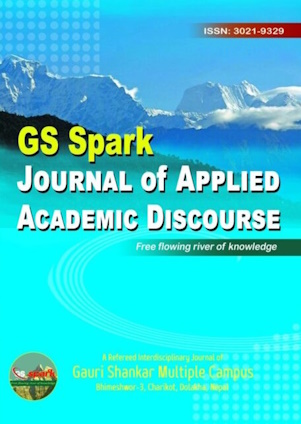Practice of Participatory Local Government Planning in Nepal
Perspective Article
GS Spark: Journal of Applied Academic Discourse, Volume 3, Issue 1, June 2025, -
Publication date: Sep 04, 2025
Views: 372 | Downloads: 0
How to cite this article
APA
In-text citation: (Adhikari, 2025)
Reference: Adhikari, G. (2025). Practice of Participatory Local Government Planning in Nepal. GS Spark: Journal of Applied Academic Discourse, 3(1), -.
Reference: Adhikari, G. (2025). Practice of Participatory Local Government Planning in Nepal. GS Spark: Journal of Applied Academic Discourse, 3(1), -.
Vancouver
In-text citation: (1), (2), (3), etc.
Reference: Adhikari G. Practice of Participatory Local Government Planning in Nepal. GS Spark: Journal of Applied Academic Discourse. 2025;3(1):.
Reference: Adhikari G. Practice of Participatory Local Government Planning in Nepal. GS Spark: Journal of Applied Academic Discourse. 2025;3(1):.
AMA
In-text citation: (1), (2), (3), etc.
Reference: Adhikari G. Practice of Participatory Local Government Planning in Nepal. GS Spark: Journal of Applied Academic Discourse. 2025;3(1), -.
Reference: Adhikari G. Practice of Participatory Local Government Planning in Nepal. GS Spark: Journal of Applied Academic Discourse. 2025;3(1), -.
Chicago
In-text citation: (Adhikari, 2025)
Reference: Adhikari, Govinda. "Practice of Participatory Local Government Planning in Nepal". GS Spark: Journal of Applied Academic Discourse 2025 3 no. 1 (2025): -.
Reference: Adhikari, Govinda. "Practice of Participatory Local Government Planning in Nepal". GS Spark: Journal of Applied Academic Discourse 2025 3 no. 1 (2025): -.
Harvard
In-text citation: (Adhikari, 2025)
Reference: Adhikari, G. (2025). Practice of Participatory Local Government Planning in Nepal. GS Spark: Journal of Applied Academic Discourse, 3(1), pp. -.
Reference: Adhikari, G. (2025). Practice of Participatory Local Government Planning in Nepal. GS Spark: Journal of Applied Academic Discourse, 3(1), pp. -.
MLA
In-text citation: (Adhikari, 2025)
Reference: Adhikari, Govinda "Practice of Participatory Local Government Planning in Nepal". GS Spark: Journal of Applied Academic Discourse, vol. 3, no. 1, 2025, pp. -.
Reference: Adhikari, Govinda "Practice of Participatory Local Government Planning in Nepal". GS Spark: Journal of Applied Academic Discourse, vol. 3, no. 1, 2025, pp. -.
ABSTRACT
It is often emphasized in discourse that Nepal’s federal system mandates participatory local planning to promote inclusive governance; however, implementation of the provisions remains limited. This study explores how participatory planning is practiced in Nepal’s local governments by analyzing legal provisions, their implementation status, and factors affecting practice. Employing qualitative methods—document analysis and literature review—the research identifies significant gaps between policy and practice. Findings reveal that although the legal framework supports inclusive planning, implementation is constrained by weak institutional capacity, limited stakeholder engagement, and entrenched power dynamics. Marginalized communities frequently lack confidence and opportunities to engage meaningfully in planning and budgeting. To address these challenges, the study recommends strengthening capacity-building initiatives for communities, institutionalizing transparent and accountable planning processes, and establishing accountability mechanisms that foster genuine participation. These measures are crucial for Nepal’s federal local governments to realize constitutional mandates for social inclusion and equitable development.
REFERENCES
---
LICENSE
This work is licensed under a Creative Commons Attribution-NonCommercial 4.0 International License.

